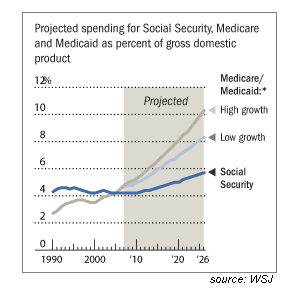

|
| weblog/wEssays | home | |
|
National Healthcare Made Easy (March 2, 2006) Amidst all the hand-wringing and political jockeying over the insane inefficiencies and skyrocketing cost of healthcare in this country, everyone overlooks a model which currently serves millions of Americans at moderate expense and which could easily serve as the blueprint for a simple, affordable National Health Plan. It's called Kaiser Permanente.  The problem is startlingly visible in the chart to the right: Medicare and Medicaid (the
Federal healthcare program for the poor) will soon cost more than the nation can possibly
afford.
The problem is startlingly visible in the chart to the right: Medicare and Medicaid (the
Federal healthcare program for the poor) will soon cost more than the nation can possibly
afford.
For those readers who live in areas not served by KP, here's the scoop. KP is the original HMO, and was founded by progressive industrialist Henry J. Kaiser to provide healthcare to his thousands of shipyard and aluminum plant workers and their families. While KP has some of the same bureaucratic inefficiencies as any health organization, in comparison to other plans it is relatively streamlined. You go to a Kaiser hospital or clinic for your care; you have a primary physician who OKs your access to tests and other specialty physicians. As a non-profit, KP has no incentive to drive up the cost of your care in order to fatten its bottom line. Its monthly premiums cover the cost of members' care, and that's all. The reason why KP is a proven model of National Healthcare is simple: unlike the "market health providers," all the incentives are in the right place. Kaiser promotes wellness and patient education, not illness, and it pays its doctors to promote wellness, not churn out unneeded operations. Let's face it. If you only get paid if the patient is ill and "needs" an operation, drugs and constant care, then why on earth would you promote wellness? You're putting yourself out of business. That is the key conflict in placing healthcare in a "market economy" paradigm. To profit, you need lots of sick people with lots of money. People without money are ignored because there's no "profit" in caring for them. The "market economy" healthcare is what is sick, for it is profit-driven and thus illness-driven. Wellness drives down profit, so it's the last thing "market providers" want to promote. Kaiser, on the other hand, is a non-profit, and it pays it's doctors flat salaries. There is no financial incentive to prescribe drugs the patient doesn't need, administer tests the patient doesn't need, or perform operations the patient doesn't need. All the supposed roadblocks to National Healthcare vanish once you remove greed as the primary driver of hospitals, doctors, attorneys and insurance companies. Much of this worthless overhead (insurance forms and bureaucratic processes, frivolous malpractise lawsuits, expensive unnecessary tests, etc.) would dry up and blow away if the nation were to institute a Kaiser-model National Healthcare. Yes, it would be expensive, but with about a third of all healthcare dollars going to overhead, the savings from cutting overhead and greedhead profits would probably cover the cost of insuring the 40 million Americans without any insurance, for the same money the nation spends now on lousy and highly unfair care. As a self-employed writer, I pay my own Kaiser, and while it's not cheap, it's about as cheap as it can possibly be--and it's fair. I get the same care as a rich person. It certainly seems a lot better than letting 40 million people fall by the wayside while a relative handful of people mint immense profits serving up illness. copyright © 2006 Charles Hugh Smith. All rights reserved in all media. I would be honored if you linked this wEssay to your site, or printed a copy for your own use. |
||
| weblog/wEssays | home |